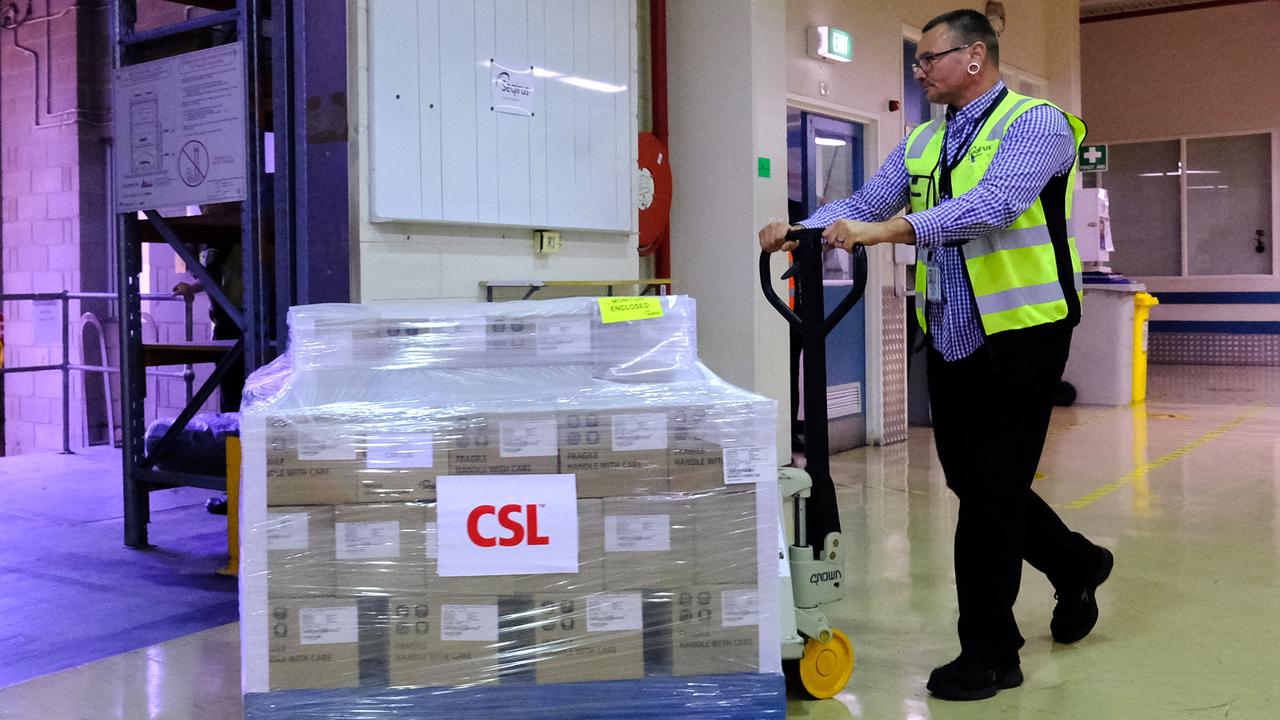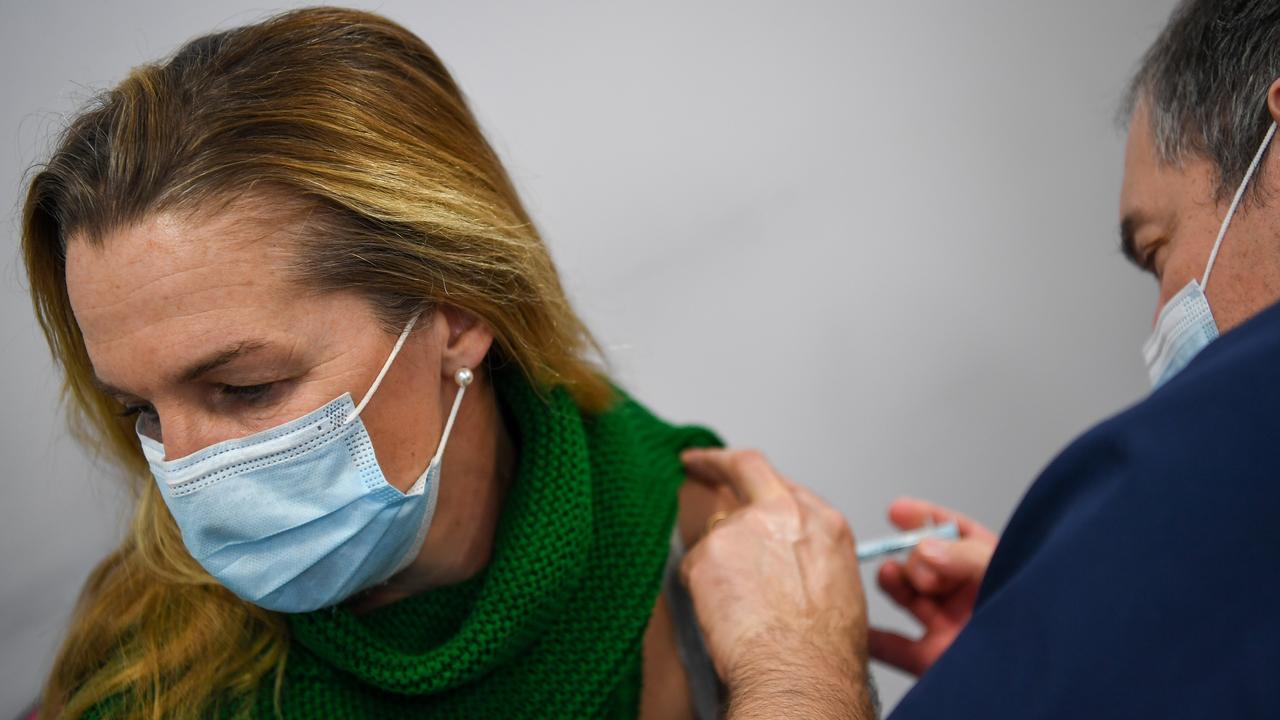AstraZeneca vaccine: What we know about blood clots and side effects controversy
Australia has changed its advice for the AstraZeneca vaccine and who should take it. So should you be worried? Here’s what we know.
Australia has issued an advisory for people under the age of 50 to consider getting the Pfizer vaccine instead of the AstraZeneca jab.
Prime Minister Scott Morrison announced the new health advice on Thursday night after the Australian Technical Advisory Group on Immunisation (ATAGI) delivered the recommendation following consideration of changed advice overseas.
A number of countries have suspended the use of AstraZeneca’s vaccine for younger people after European authorities said blood clots should be listed as a “very rare” side effect.
Canada, France, Germany, Italy, Belgium and the Netherlands are not recommending the shot for younger people, and the United Kingdom has changed its medical advice to offer people aged under 30 an alternative to AstraZeneca if possible.
Spain has said it will also reserve the vaccine for use in those over 60.
AstraZeneca’s vaccine has been administered in at least 111 countries and is the vaccine Australia is producing locally and relying on to vaccinate the majority of the population.
So should Australians feel confident about getting the jab? Here is what we know.
DOES IT CAUSE BLOOD CLOTS?
On Wednesday, the European Medicines Agency said blood clots should be listed as a “very rare” side effect, although it is still encouraging countries to use the vaccine.
The announcement came after the EMA examined 86 blood clotting cases, 18 of which were fatal.
The numbers highlight how rare the condition is, as around 25 million people in Europe have received the AstraZeneca vaccine.
Most of the cases were in women aged under 60.
Britain’s decision to offer an alternative jab to those under 30 came after data showed 79 blood clots and 19 deaths among people who had received one of 20 million doses administered in the UK.
EMA chief Emer Cooke said no particular risk factor had been identified and the clots may be linked to an immune response to the vaccine.
“The benefits of the AstraZeneca vaccine in preventing COVID-19 overall outweigh the risk of side effects,” she told a news conference.
“It is saving lives.”
The World Health Organisation’s vaccine experts on Wednesday echoed EMA’s findings, saying a causal relationship between the vaccine and blood clots was “plausible but is not confirmed”.
“We believe the benefit-risk balance is very much in favour of the vaccine,” said the WHO in response to an AFP query.
Previously the EMA’s preliminary review suggested the vaccine was not associated with an increase in the overall risk of blood clots but could be associated with clots linked to very rare condition involving low levels of blood platelets (thromocytopenia).
German researchers have previously stated that they believe they have found a link, and have also estimated the incidence is much higher at one in 100,000. Last month it restricted the vaccine for general use only in people aged over 60.
Two separate teams of medical researchers in Norway and Germany said they had found the vaccine could trigger an autoimmune reaction causing blood to clot in the brain, which could explain the rare cases.
The German researchers said that patients who show symptoms, such as headaches, dizziness or impaired vision, could be diagnosed with a blood test, so people shouldn’t be afraid of getting the vaccine.
“Very, very few people will develop this complication,” Greifswald University Clinic Professor Andreas Greinacher said in a press conference last month. “But if it happens, we now know how to treat the patients.”
RELATED: Australia’s first locally manufactured AstraZeneca jabs rolled out

WHO DOES IT IMPACT?
The EMA’s preliminary analysis of nine deaths that occurred in Europe found most of these occurred in people under 55 and the majority were women.
In a statement on Thursday, the Australian Technical Advisory Group on Immunisation (ATAGI) recommended the Pfizer vaccine is “preferred” over the AstraZeneca jab for adults aged under 50 years.
However, it said the vaccine could be used where the benefits were likely to outweigh the risks and the person has made an informed decision.
Anyone who has already had the first dose of the AstraZeneca vaccine without any serious adverse effects can be given the second dose, including adults under 50 years.
In a Twitter thread, infectious disease physician Prof Allen Cheng, who is a member of ATAGI, explained the group’s decision and explained why Australia had set the age at 50, instead of 30 like the UK had done.
“If there was a lot of COVID about, then the benefit in preventing COVID would outweigh the risk for almost all adults, except for very young adults. This is pretty much the situation in the UK at the moment,” he wrote.
“If a younger person said that they were happy to take a 1 in 200,000 risk of clotting for the benefit of getting protected from COVID earlier, then as long as this was an informed decision, we should respect that choice.”
Prime Minister Scott Morrison earlier noted the risks associated with the AstraZeneca compared favourably to other common medications. For example, the possible side effects for women taking the oral contraceptive pill, which can include blood clots, was 7-10 per 10,000.
News.com.au asked Health Minister Greg Hunt as early as March 24 whether Australia would consider introducing blood tests to diagnosis those at risk, or would stop use of the AstraZeneca vaccine in people under 55, as France had done. The question was referred to the Health Department, who provided a statement from Australia’s Therapeutic Goods Administration (TGA).
The TGA said it was closely monitoring the safety of the AstraZeneca vaccine and working closely with international regulators, through the International Coalition of Medicines Regulatory Authorities (ICMRA).
At that point, it said the TGA had not received any reports of blood clot cases in Australia after the use of the vaccine, although one case in a 44-year-old Victorian man was subsequently discovered
In its statement on the vaccine from March 19, the TGA noted a link to the vaccine had not yet been proved. The TGA noted that both European and UK regulatory agencies have said the benefits of the vaccine continue to outweigh the risk.
Last week ATAGI reassessed Australia’s position after Canada suspended its use of the vaccine in people aged under 55 and Germany restricted use to those aged over 60.
At that point it found no link between the vaccine and blood clots but advised people with a confirmed history of the rare condition cerebral venous sinus thrombosis to not have either the AstraZeneca or Pfizer vaccines, as a precaution.
RELATED: Your COVID vaccine questions answered

HOW EFFECTIVE IS THE VACCINE?
One of the crucial aspects of the vaccine is how effective it is and AstraZeneca also faced controversy around its reporting of numbers.
AstraZeneca was accused last month by US medical experts of releasing “outdated” data and cherrypicking information to make its vaccine look better, The New York Times reported.
In response to the criticism, the company released follow-up results that confirmed the vaccine was 76 per cent effective against symptomatic COVID-19, which is slightly lower than the 79 per cent previously reported.
However, it was 100 per cent effective at preventing severe or critical disease and hospitalisation.
NIAID head Anthony Fauci described the controversy as an “unforced error” by the company, while others warned it had the potential to erode public trust.
Experts have been quick to point out though, that the vaccine is performing well, and both levels of effectiveness were good.
Laureate Professor and Nobel laureate Pete Doherty of Australia’s Doherty Institute tweeted the results and said “both are good!”.
Infectious diseases expert Greg Dore of UNSW’s Kirby Institute tweeted: “Still think final results will confirm vaccine is very good, which we knew from earlier trials & real-world data”.
charis.chang@news.com.au | @charischang2




